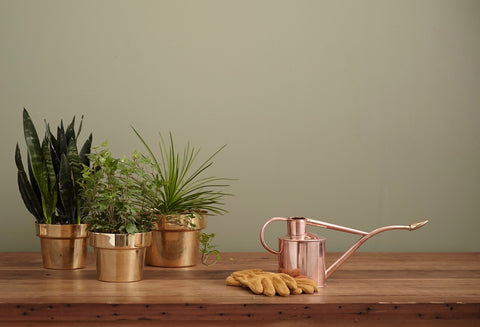5 Health Benefits of Indoor Plants

Indoor plants are popular right now. Glorious photos of green vegetation brightening a sunny living room or hanging in the doorways of a greenhouse are populating social media posts and inspiring our interior design choices. You needn't be an avid gardener or have a green thumb to enjoy a room full of indoor plants. Not only are plants stunning in the home decor, but they offer a range of health benefits. Here are 5 health benefits of indoor plants based on scientific study and research.
1. Improved Air Quality
As global citizens, we are becoming more aware of the importance of nature for our health and well-being. The increased number of wildfires around the globe is awakening humanity's concern for the Earth's environment including changes in the climate or atmosphere. Essentially, the air we breathe is an exchange between animals and plants. The forests, prairies, and wetlands of our beautiful planet inhale carbon dioxide and release oxygen. During this process, additional chemicals from the surrounding air are also ingested by the plant's leaf structures and released into the soil where microorganisms digest the various chemicals to produce nutrients for plants. The various nutrients like nitrogen, phosphorus, and potassium are exchanged via the roots with the tiny soil microbes encouraging healthy plant growth.
The above air cleaning process happens with indoor plants too! Volatile organic compounds (VOC's) found in carpets, paints, cleaning products, plastics, and furniture are invisibly present at room temperature indoors. Without proper ventilation, these chemicals can build up in the air and reach toxic levels. Scientific studies published by NASA and Environmental Science and Pollution Research concluded that different types of indoor plants absorbed various types of VOC's. For example, a Ficus elastica or a "Rubber tree" was found to remove benzene and toluene emitted by wallpapers, adhesives, furniture wax, rubbers, and tanned leathers. A Schefflera arboricola or "Umbrella tree" removed formaldehyde that is present in paints, synthetic fabrics, and pressed wood.

Ficus elastica removes harmful chemicals like benzene from the air.
Laboratory experiments conducted by NASA show a considerable improvement in indoor air quality in just 24 hours after a plant was introduced to a space with high levels of VOC's. Thus, adding plants to your home will help you breathe cleaner indoor air. The more plants the better the air quality of your home. If you are new to indoor plants, ask for help from your green thumb friends or a staff member of a local nursery about an easy to care for indoor plant.
2. Increased Energy Levels
Studies show that communing with the natural world increases our feelings of well being and vitality. As our outlook becomes more positive, so does our energy level. Plants in the home or office offer more than a positive outlook. We learned that one health benefit of indoor plants is cleaning the air of toxic levels of VOC's. As the air-quality increases, so does our vitality. Our physical body, such as the lungs, liver, and blood, is not overburdened by invisible harmful chemicals. Additionally, as plants clean the air, our green symbiotic friends also contribute oxygen to the indoor environment.
Increased oxygen levels in our bodies allow the cells to perform optimally boosting brain and muscle function, as well as, increased metabolism and waste elimination. Furthermore, many bacteria and viruses are anaerobic and can not survive in oxygenated conditions. As our bodies work efficiently with more oxygen and less harmful chemicals in the air, we feel less sluggish with more energy. Who would have thought an indoor garden would have such an effect on our vigor and vitality?

3. Better Concentration & Memory
A few days in nature has been proven to greatly increase our cognitive ability in a recent study by Kansas University. Disconnecting from devices, reducing constant interruptions, and being surrounded by the natural world stimulated the brain. According to Paul Atchley, the associate professor of psychology at KU, "We constantly shift attention from one source to another, getting all of this information that simulates alarms, warnings, and emergencies. Those threats are bad for us. They sap our resources to do the fun thinking and cognition humans are capable of."
Your home or office does not need a forest to increase your memory or concentration, a few plants can assist in enhanced performance. A recent study at the University of Exeter found plants introduced into a sparse office environment increased productivity by 15%. Participants in the office study reported feeling higher levels of concentration and improved air quality.
Nature, as well as, a simple potted plant can provide a space to rest and daydream from the constant interactions required in our daily lives. This small break in the mental clutter can lead to less stress and an enhanced feeling of well-being. Humans have a positive association with plants and nature. Having a plant in your home or office provides a respite from constant stimulation allowing the brain to relax and just like that, enhancing your cognitive abilities of concentration and memory.

4. Improved Relationships
Can a plant really help improve relationships? The American Society of Horticultural Science reported plants did indeed improve relationships in a study conducted in an Assisted Living Center with aging adults. Eighteen residents participated in four interactive horticultural classes. Lessons included simple tasks like maintaining a potted plant. Some members of the group were required to take responsibility for the care of an indoor plant, while other members' plants were maintained by staff members. Those who cared for their own plants were more alert and interacted more with fellow residents and staff while requiring less staff care. They self-reported being active and happy (self-rated happiness) with increased perceptions of personal control (ASHS).
To have responsibility for another living being whether a plant or animal develops our awareness and compassion for others. We must step outside of our own needs and care for the survival of another. We learn to feel genuine concern and empathy. Both feelings are a necessity for building healthy human relationships.

5. Longevity
If the previous 4 health benefits aren't enough evidence to convince you that having an indoor garden could lead to a longer happier life, then here are a few additional findings to clear up the matter.
According to research by Dr. Bradley Willcox of the University of Hawaii, one of the common factors of centenarians around the globe is physical fitness in the form of walking and/or gardening into old age. Research has found gardening reduces stress, increases personal well-being, and creates a shared sense of community. As we age, the value we can offer ourselves and our community is of vital importance to our state of health and longevity. In Willcox's study, he claims that gardening gives centenarians something to get up for every day.
Don't worry if you are not yet a gardener, there is still time to gather an abundance of indoor plants to stimulate your senses, reduce stress, clean the air, improve your health and relationships so you can live a longer, happier life.

1 comment
Number 3 and 4- I couldn’t agree more.